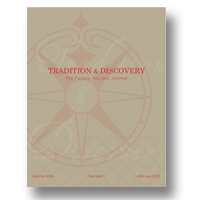|
journal and society information |
|
1.
|
Tradition and Discovery: The Polanyi Society Periodical:
Volume >
42 >
Issue: 3
Editorial Board and Submissions Guide
view |
rights & permissions
| cited by
|
|
|
|
|
|
|
2.
|
Tradition and Discovery: The Polanyi Society Periodical:
Volume >
42 >
Issue: 3
Paul Lewis
Preface
view |
rights & permissions
| cited by
|
|
|
|
|
journal and society information |
|
3.
|
Tradition and Discovery: The Polanyi Society Periodical:
Volume >
42 >
Issue: 3
Notes on Contributors
view |
rights & permissions
| cited by
|
|
|
|
|
4.
|
Tradition and Discovery: The Polanyi Society Periodical:
Volume >
42 >
Issue: 3
News and Notes
view |
rights & permissions
| cited by
|
|
|
|
|
essays |
|
5.
|
Tradition and Discovery: The Polanyi Society Periodical:
Volume >
42 >
Issue: 3
Eduardo Beira
“On Popular Education in Economics”:
Another Foundational Text of Michael Polanyi’s Thought
abstract |
view |
rights & permissions
| cited by
This essay introduces Michael Polanyi’s 1937 lecture “Popular Education in Economics” and its context. This lecture is an important document sketching Polanyi’s initial critique of traditional liberalism and its alternatives (communism and fascism). Polanyi emphasizes the importance of mass enlightenment by education in economics in order to revise laissez faire economics “by some other means than civil war,” because until recently “man was not intelligent enough to understand the economic system.” Polanyi calls for “progress by persuasion” in order to empower man to master and direct the economic life. For the first time, Polanyi refers to the work of Keynes as an opportunity to avoid the mistakes of communism while allowing a reframing of liberal ideas.
|
|
|
|
|
6.
|
Tradition and Discovery: The Polanyi Society Periodical:
Volume >
42 >
Issue: 3
Michael Polanyi
On Popular Education in Economics
abstract |
view |
rights & permissions
| cited by
“On Popular Education in Economics,” an unpublished lecture that Michael Polanyi delivered in late February of 1937 to the Manchester Political Society, succinctly presents Polanyi’s understanding of recent political and economic history, including the rise of communist and fascist governments. Polanyi argues that new economic ideas need to be better understood by the intelligent layman and that economics education on a wide scale can address the social and political problems of the modern world.
|
|
|
|
|
7.
|
Tradition and Discovery: The Polanyi Society Periodical:
Volume >
42 >
Issue: 3
Anne McCants
Measuring Prosperity and Preserving Freedom:
An Economics Education with Michael Polanyi
abstract |
view |
rights & permissions
| cited by
In a time of heightened economic and political insecurity, sustained prosperity is a reasonable public goal. But it is not sufficient on its own as a bulwark against the misguided economics of collectivist regimes, nor can it easily resist what in the past have been their stunning descents into tyranny. Michael Polanyi argued that the collective purpose of the community had to be based on something other than mere class struggle or civil unrest. Raising the bar for the common man to comprehend the logic of the trade cycle, and to appreciate the macro-dynamics of unemployment in the face of curtailed demand, was one small, but highly significant, step towards the prevention of civil war and the promotion of prosperity with justice and freedom. The present is surely as good a time as any to renew Polanyi’s call for an economics education for the common man, and to reassert the moral principles upon which it rests.
|
|
|
|
|
8.
|
Tradition and Discovery: The Polanyi Society Periodical:
Volume >
42 >
Issue: 3
Harry Prosch
Polanyi’s Economics and the New Start in Europe
abstract |
view |
rights & permissions
| cited by
Originally presented as a paper at the 1991 Kent State conference, this essay offers Prosch’s interpretation of Polanyi’s views on social order and economics. It also engages “Popular Education in Economics,” which is included in this issue of TAD.
|
|
|
|
|
journal and society information |
|
9.
|
Tradition and Discovery: The Polanyi Society Periodical:
Volume >
42 >
Issue: 3
Jon Fennell
Polanyi’s “Illumination:” Aristotelian Induction or Peircean Abduction?
abstract |
view |
rights & permissions
| cited by
Illumination is a prominent feature of the phenomenon of discovery that is at the heart of Polanyi’s Personal Knowledge. Illumination is prominent as well in Louis Groarke’s “Aristotelian induction” and C. S. Peirce’s abduction. This study pursues the question of whether the term has similar meaning across these three contexts. Close examination of what is said about illumination in each of them shows that Groarke assigns an epistemological autonomy to illumination that is recognized by neither Polanyi nor Peirce. Further, Polanyi and Peirce concur in the role assigned to verification and thereby in the importance of temporality and a community of inquiry.
|
|
|
|
|
10.
|
Tradition and Discovery: The Polanyi Society Periodical:
Volume >
42 >
Issue: 3
E-Reader Instructions
view |
rights & permissions
| cited by
|
|
|
|
|
11.
|
Tradition and Discovery: The Polanyi Society Periodical:
Volume >
42 >
Issue: 3
Polanyi Society Resources and Board
view |
rights & permissions
| cited by
|
|
|
|





